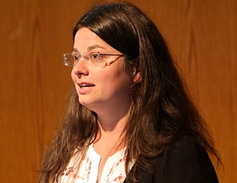The 14th IASTED International Conference on
Computers and Advanced Technology in Education
CATE 2011
July 11 – 13, 2011
Cambridge, United Kingdom
INVITED SPEAKER
TEL for the Next Decade: the creation of personalised and adaptive semantically-rich e-learning
Abstract
Recently, the EU Commission has shown recognition of the future importance of personalised learning by investing hundreds of millions of Euros in researching this area. To this end a number of major European projects have been funded that focus on adapting learning materials to a student’s requirements.
This is no wonder, as the current generation of learners have grown up accustomed to personalization in most aspects of their digital life. This starts with the games they play and is further developed in the mobile devices they use, which can adapt to the place they’re used from (e.g., such as offering different networks) or they can adapt web materials to the screen size and resolution of their mobile device, to name but a few. In addition learners are using technologies and systems that implement other personalisation technologies (albeit in a piecemeal manner), such as those of the social web (Facebook et al) and recommender systems (such as Amazon).
In recognition of this trend, a great body of previous research shows that personalization is a highly desirable method for online teaching. However, this has not yet been introduced into the mainstream e-teaching. Many different engines have been proposed to support such personalization on the Web. They all however have some weaknesses, which may have been partially responsible for the slow uptake of these promising techniques. Therefore, this talk will discuss the advantages and disadvantages of current adaptation engines, and will introduce a new adaptation engine, ADE (Adaptive Display Environment for Adaptive Educational Hypermedia), that will be used as a study in how future personalised learning systems should be developed. In addition, the authoring process for these systems is far from trivial, and is often the main hurdle to overcome in order to bring this useful paradigm to a greater number of users. This talk will detail some approaches that aim to reduce the complexity of this authoring process.
In this invited talk Dr. Cristea will describe the promise as well as the challenges of creating personalised and adaptive, semantically-rich e-learning experiences to support our students in the coming decade
Biography of the Invited Speaker

Dr. Alexandra I. Cristea is associate professor in the Department of Computer Science at the University of Warwick. She is the Director of Graduate Research in Computer Science, and Coordinator of the Intelligent and Adaptive Systems group, consisting of 14 academics (5 affiliated) and 19 research students. Her research interests include adaptive educational systems, authoring of adaptive hypermedia, user modelling, intelligent tutoring systems, semantic web technologies, concept mapping, and artificial intelligence. She has published more than 150 papers on these subjects. She is leading the work package on Weblog structure and semantics in the BLOGFOREVER EU FP7 project starting January 2011 as well as is leading the work package on Authoring in the GRAPPLE EU FP7 project started in February 2008 and has recently lead the Minerva project entitled ‘ALS’ (Adaptive Learning Spaces) (October 2006 – April 2009). Previously, she has also successfully lead as project manager the ‘ADAPT’ Minerva project, that was recommended as outstanding by the EU Commission (2002-2005). She was previously working at the Eindhoven University of Technology, The Netherlands, as assistant professor, at the University of Electro-Communications, Tokyo, Japan, as research associate, and at the University ‘Politehnica’ of Bucharest as assistant, all these positions including research and teaching. She has graduated ‘Politehnica’ University of Bucharest, Romania, with two degrees, a Masters in Computer Science and one in Economical Engineering. She received her PhD at the University of Electro-Communications, Tokyo, Japan. She has been organizer of workshops, co-organizer, panelist and program committee member of various conferences in her research field (including, for example, ED-MEDIA, Hypertext, Adaptive Hypermedia, ICCE, ICAI). She was demonstration chair of EC-TEL 2009, and was track co-chair of Hypertext 2007 and general workshop co-chair of the ICALT 2007 conference in Niigata, Japan. She will be hosting ICALT 2013. She is executive peer reviewer of the IEEE LTTF Education Technology and Society Journal and she is co-editor of the Advanced Technologies and Learning Journal. She has given invited talks in various countries, e.g., UK, Netherlands, Spain, Japan, Finland, Romania, etc. She acted as UNESCO expert for adaptive web-based education at a high-level (Ministry of Education and Educational institutes) meeting of East European countries. She is an IEEE and IEEE CS member.




















